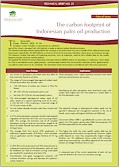| Brief |
 |
|
| Title | The carbon footprint of Indonesian palm oil production | | Author | Ni'matul Khasanah, Meine van Noordwijk, Andree Ekadinata, Sonya Dewi, Subekti Rahayu, Harti Ningsih, Anang Setiawan, Elissa Dwiyanti and Rahayu Octaviani | | Year | 2012 | | Publisher | World Agroforestry Centre - ICRAF, SEA Regional Office | | City of Publication | Bogor, Indonesia | | Series Number | Technical Brief No 25: palm oil series | | Number of Pages | 10 | | Call Number | PB0047-12 |
|
| Abstract: |
| The Renewable
Energy Directive (RED) of the
European Union includes a commitment to substitute
part of the Union’s transport fuel with biofuels in order to reduce carbon dioxide emissions.
The directive also takes partial responsibility for increases in emissions that may occur outside of the national accounting
frameworks. Specifically, the RED defines a minimum level of net emissions reduction, also known as emissions savings.
The directive implies that palm oil exporting countries, such as Indonesia, need to have reliable data on the carbon
footprint of palm oil to be used for biofuel.
We applied the Biofuel Emissions Reduction Estimator Scheme (BERES) tool to 23 plantations in Indonesia, which abide
by what is considered current ‘good practice’, and estimated whether the net emissions reduction of this ‘good practice’
was able to meet minimum EU standards. The estimation of the net emissions included oil palm life-cycle assessment. |
|
|
Download file(s): Click icon to download/open file.
|
| |
File Size |
Description |

|
705 KB |
Softcopy |
|
|
|
| Viewed in 2927 times. Downloaded in 653 times. |